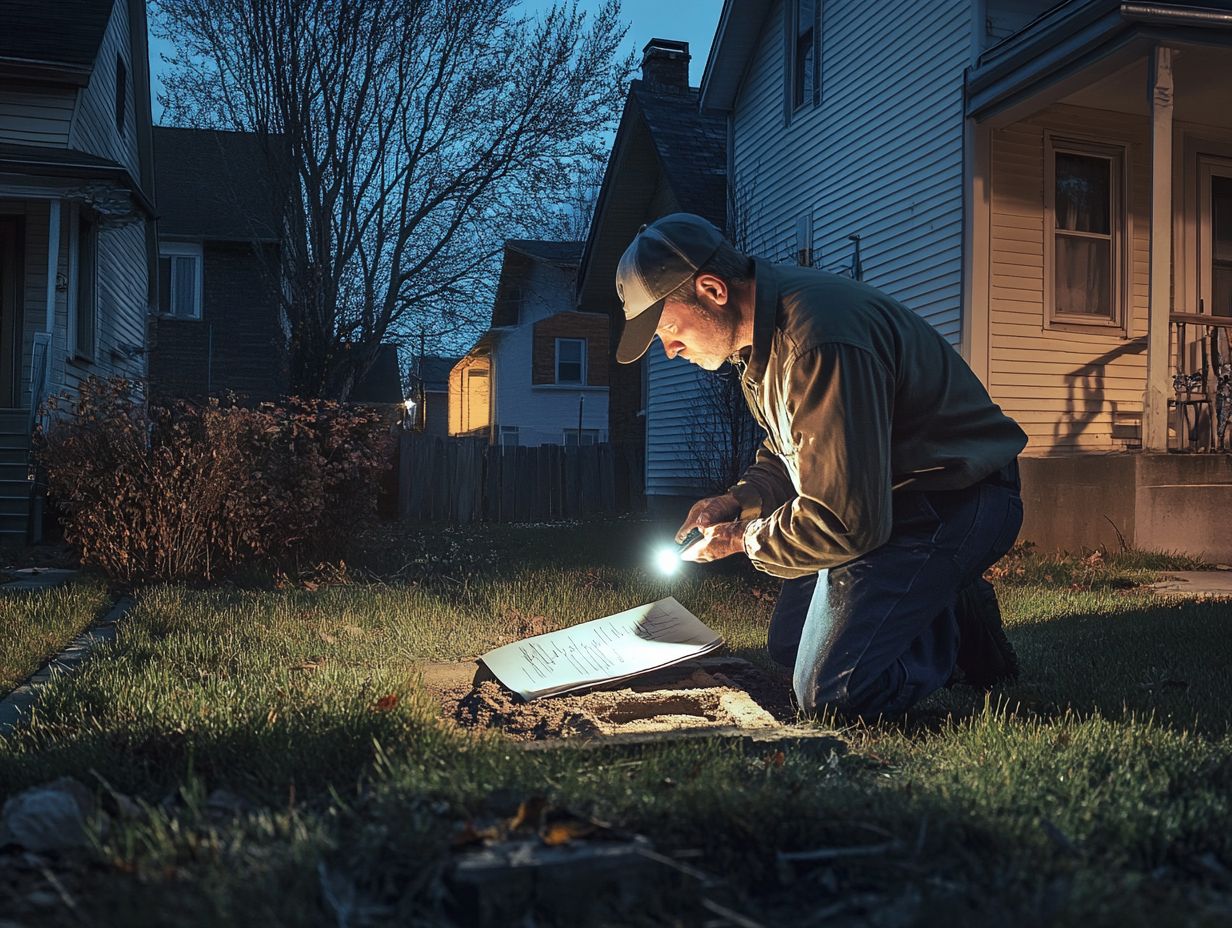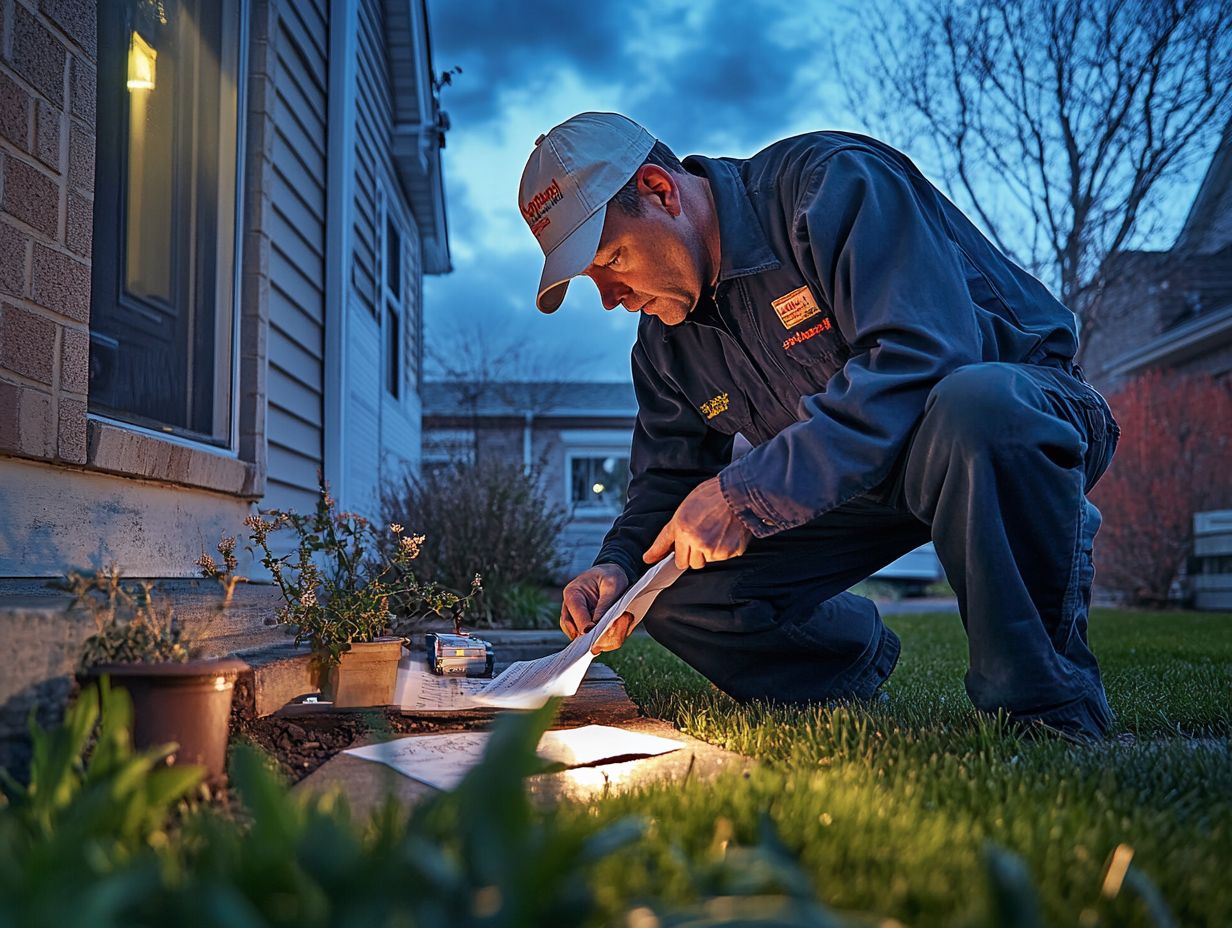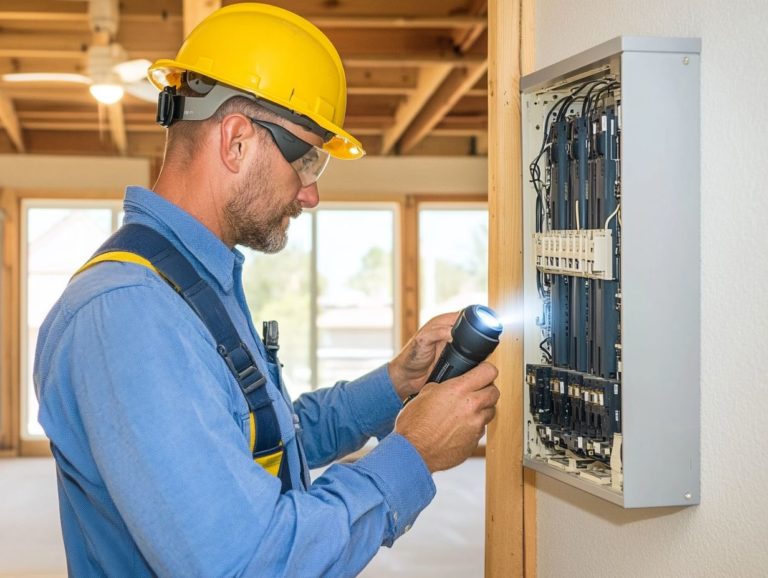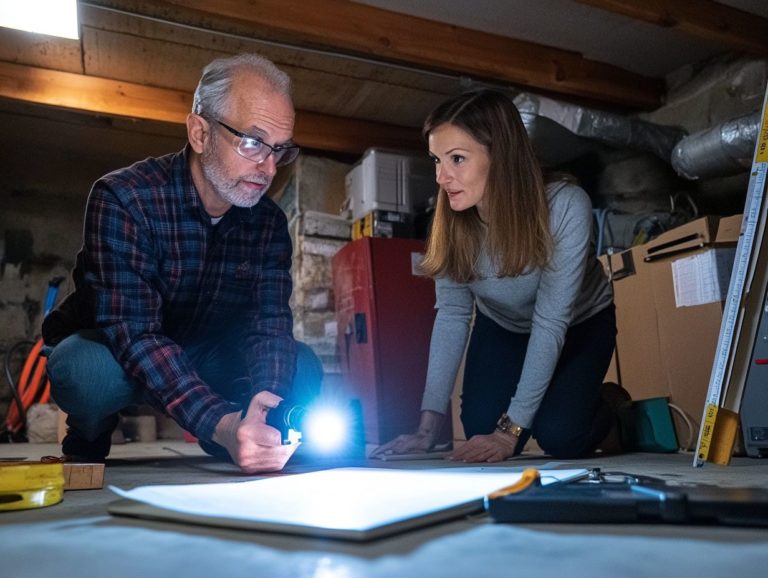Navigating the Home Inspection Process
Navigating the home inspection process can feel overwhelming for both buyers and sellers. Understanding its purpose is crucial, as it uncovers hidden issues that may significantly impact your investment.
This guide covers the essentials: preparing for the inspection, interpreting the report, and addressing any concerns that arise. With valuable tips in hand, you’ll confidently tackle this important step in your real estate journey.
Contents
Key Takeaways:

A home inspection is vital. It identifies potential issues and provides peace of mind for buyers.
Before the inspection, clean, declutter, and organize your space to ensure a smooth process.
Understand the inspection report’s findings and address them promptly to ensure a successful outcome.
Understanding the Purpose of a Home Inspection
A home inspection is an in-depth look at a property’s physical state. It evaluates key components like plumbing, electrical systems, heating and cooling systems, the foundation, and the roof.
This analysis uncovers potential issues that may affect the property’s condition and safety. With this knowledge, you can make informed decisions about your investment and negotiate effectively.
What is a Home Inspection and Why is it Important?
A home inspection is a thorough evaluation of a property’s condition, typically performed by a skilled professional. Understanding the role of home inspections in the home buying process reveals critical issues affecting your decision-making.
This assessment covers essential components like the roof, plumbing, electrical systems, and the foundation. Recognizing problems early helps avoid unexpected expenses in the future.
With this insight, you can negotiate repairs or price adjustments before finalizing the deal. Understanding the home’s condition can greatly influence your investment strategy.
Preparing for a Home Inspection
Preparing for a home inspection involves proactive steps for both buyers and sellers. This preparation is key to understanding the home inspection process and ensures a seamless inspection experience.
Steps to Take Before the Inspection
Gather any documents related to recent repairs and maintenance before the inspection. These records provide valuable insights into the property’s condition.
Organized documentation shows your commitment to the home, helping buyers feel secure in their investment. When buyers know the property’s upkeep, they enter negotiations with confidence.
This transparency can be a powerful bargaining tool, potentially reducing requests for repairs or price reductions later. By clarifying the property’s safety compliance, you empower buyers to make informed decisions.
What to Expect During the Home Inspection

During a home inspection, expect a thorough evaluation of key property aspects. Inspectors will check structural elements like the foundation and roof, as well as critical systems like plumbing, electrical, and heating and cooling, as outlined in understanding the basics of home inspections.
This comprehensive assessment gives you a clear picture of the home’s condition, helping you make informed decisions.
Areas of the Home That Will Be Inspected
During a home inspection, you can expect key areas to be thoroughly examined, including the roof, foundation, HVAC systems, plumbing, and electrical systems. Each of these components plays a crucial role in determining the property s safety standards and overall condition.
The roof inspection isn t just about the shingles. It delves into the underlying structure, ensuring there s no water damage or potential for leaks lurking beneath the surface.
A careful inspection of the foundation can reveal cracks or settling issues, which might signal deeper structural concerns that could escalate if not addressed promptly.
When evaluating heating, ventilation, and air conditioning (HVAC) systems, the focus is on efficiency and proper functionality. This ensures your home remains comfortable while saving on energy costs.
Plumbing inspections are equally vital. They can uncover hidden leaks or outdated materials that might lead to costly repairs down the road.
Lastly, it s essential for electrical systems to align with current safety regulations. This means identifying any outdated wiring or overloaded circuits that could pose fire hazards. These areas significantly contribute to the overall assessment, enabling you to make informed decisions as a prospective buyer.
Interpreting the Inspection Report
Interpreting the inspection report offers essential insights into the findings and recommendations about the property’s condition. This understanding of the home inspection process timeline enables you to make informed decisions during negotiations, ensuring you navigate the process with confidence and clarity.
Understanding the Findings and Recommendations
Understanding the findings and recommendations in the inspection report highlights both critical issues that might be deal breakers and minor fixes that can easily be tackled before you finalize the sale.
By carefully reviewing these insights, you can discern what truly qualifies as a significant problem think structural integrity or plumbing issues versus minor repairs like cosmetic touch-ups. Recognizing this distinction is essential for prioritizing risk mitigation strategies.
This can protect your investment and enhance the property s value over time. It’s equally important to consult with qualified professionals who can provide an expert opinion on necessary repairs. This ensures that any potential red flags are addressed appropriately and promptly.
Addressing Issues Found During the Inspection
Addressing the issues uncovered during a home inspection is essential for preserving the property’s value. Understanding the home inspection process for sellers enables you to choose your negotiation options with confidence, ensuring that potential buyers can make informed decisions based on the inspection findings.
Options for Dealing with Problems

When you encounter issues highlighted in a home inspection, act quickly! You have various negotiation strategies that can significantly shape the sale’s outcome. These include:
- Requesting repairs
- Negotiating price reductions
- Seeking credits for future maintenance
Using these strategies can significantly impact your investment. For instance, asking for repairs can result in immediate enhancements to the property s condition, potentially boosting its value and increasing your satisfaction with the purchase.
Conversely, negotiating a price reduction directly influences the purchase price, freeing up extra funds for renovations or other investments you may have in mind. Requesting credits towards future maintenance offers a different kind of financial flexibility, allowing you to tackle issues at your own pace after the sale is finalized.
Each option comes with its own set of advantages and drawbacks, making it essential to consider carefully how your chosen path aligns with your long-term financial objectives.
Tips for a Successful Home Inspection
To achieve a successful home inspection, you should be thoroughly prepared and mindful of common buyer concerns. It’s also essential to embrace the expert guidance offered by professional inspectors, especially when understanding the process of home inspections throughout the process.
This proactive approach will not only enhance your experience but also pave the way for a smoother transaction.
Advice for Buyers and Sellers
As a buyer, approach the home inspection with a thoughtful list of questions and concerns. It’s essential to understand the home inspection process, while sellers must tackle potential issues directly to enable smoother negotiations.
Recognizing red flags such as structural damage or aging systems that could lead to unexpected expenses is essential. Communicate your findings and concerns transparently with the sellers to foster mutual trust.
Sellers can significantly boost their property s appeal by addressing necessary repairs before the inspection. This showcases their commitment to transparency and helps support their asking price.
Utilizing effective negotiation strategies, like offering to cover some repair costs, can lead to great outcomes for both parties, making the entire process more favorable.
Frequently Asked Questions
What is the purpose of a home inspection?
A home inspection is a professional evaluation of the current condition of a property. It is typically performed before a home purchase to identify any potential issues or defects that may affect the value or safety of the property.
How do I find a reputable home inspector?

One way to find a reputable home inspector is to ask for recommendations from friends, family, or real estate agents. You can also research online and read reviews from previous clients. Make sure to choose an inspector who is licensed and experienced in your area.
What should I expect during a home inspection?
During a home inspection, the inspector will thoroughly examine the property’s main systems and components, including the roof, foundation, plumbing, electrical, and heating, ventilation, and air conditioning systems. They will also check for any structural issues, safety concerns, and potential repairs or maintenance needs.
Do I need to be present during the home inspection?
While it is not required, it is highly recommended that buyers attend the home inspection. This allows you to ask questions and understand any issues the inspector may find. It also gives you a chance to see the property in person and get a better idea of its condition.
What happens if the home inspection reveals issues?
If the home inspection reveals issues, you have a few options. You can negotiate with the seller to have them address the issues before closing, ask for a credit or price reduction, or choose to walk away from the purchase. It ultimately depends on the severity of the issues and your agreement with the seller.
Can a home inspection be waived?
While it is not recommended, a home inspection can be waived if you are willing to take on the risk of potential issues with the property. However, understanding the home inspection timeline is generally considered a crucial step in the home buying process and can save you from unexpected expenses in the long run.






